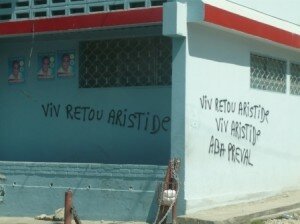Haiti’s displaced: Caught between greedy landlords and an absentee government
Co-authored by and Laura Raymond, Education and Outreach Associate for CCR
Today the Center for Constitutional Rights delegation in Haiti visited the Barbancourt II displacement camp in Port-Au-Prince. This camp is home to 310 families who lost their homes in the earthquake and have set up tents, tarps and corrugated metal structures with the few possessions they have left on the corner of an industrial company’s property. We talked with camp leaders and other residents who told us that the owner has notified them that they will be evicted in a week. This is the latest in what has been a series of threats; last November, the owner showed up with twenty four police with guns drawn.
Regardless of what the landowner might like, international law concerning the treatment of internally displaced people does not permit him to effectuate (or the Haitian government to permit) forced evictions of this population. The Inter-American Commission said as much in the precautionary measures it issued to Haiti as a result of a petition CCR worked on with the Institute for Justice and Democracy in Haiti and other Haitian and US human rights partners. But the people of Barbancourt II need help. Now.
Barbancourt II is not a place that these families want to settle into. To make matters worse, there is a several foot deep, fetid pool of human and other waste that has taken over a large area of the back portion of the camp. Residents told us that the people whose tents abut the pool are breaking out in nasty rashes and constantly fight off disease-carrying mosquitoes. The residents are disgusted that, solely as a result of their displacement, they are being forced to live in such conditions. The camp residents were very clear that they want to move into safe, long-term housing. The problem is that they have no place to go and if they are evicted they will be out on the streets.
The residents told us that they are even more disgusted by the hostility of the landowner and the lack of response fromthe government officials who are charged with ensuring that they live in a safe environment. Based upon the landowner’s zeal to evict these people, one can only deduce that he allows the pool of waste to remain in the camp as a further incentive to get the families to leave. When the residents took matters into their own hands and attempted to dig a drainage ditch to have the water flow into an external waste canal located adjacent to a neighbor’s property, they told us that a man on the neighboring property waived a .38 caliber pistol and threatened to shoot any resident who tried to drain the water from the camp. When the residents complained about the pool to the Ministry of the Interior, the entity charged with dealing with these camp issues, they were completely ignored.
So, after we left the camp, the delegation raised the issues facing the Barbancourt II residents with the Ministry of Interior official who’s in charge of the camp. Not surprisingly, he denied even hearing of the camp, never mind acknowledging that he received a complaint from the residents. But once we showed him the pictures of the waste pool, he committed to take action.
In what was the most bizarre irony of the day, Barbancourt II is literally right across the street from an enormous, security-laden, religious charity called “Food for the Poor.” Well guess what? The poor folks in the camp across the street got zero food from Food for the Poor. They described their anger at watching truck after truck laden with food come out of the heavy metal gates and then turn to deliver the food to other locations. They’d written their neighbor a letter telling them they are starving and need some of this food and had not gotten a response. We thought this was ridiculous too. So we went right across the street to ask them to explain how they don’t supply food to the hungry people in the camp across the street. They told us they don’t do direct service and that they didn’t know this camp right across the street was starving in the shadows of their Food for the Poor building. They said they’d talk to a neighborhood priest about it, and CCR will follow up on this.
In many ways, the stakes for Haiti are higher now than they were just after the earthquake. We keep hearing that the international community is pulling its operations out of Haiti. In fact, Barbancourt II told us that the Spanish Red Cross will soon stop delivering water to their camp, as their contract has run out. Many of the large NGOs that made themselves indispensable for people’s survival failed to properly link up with, help strengthen, and build the capacity of the Haitian government. Now the money is drying up and they are readying to move on to the next disaster zone.
After a year of inaction on any kind of a resettlement plan or reconstruction, the landowners and the Haitian government are anxious to remove displaced persons from private property first and then get around to finding somewhere decent for them to live at some undisclosed date in the future. But that’s not what the people in the camps want and it’s not what international law allows.
###
Laura is the Education and Outreach Associate for CCR’s International Human Rights docket. She’s focused on CCR’s work regarding private military contractors and human rights issues in Haiti, Honduras and Palestine. She is the co-editor of The Global Activist’s Manual: Local Ways to Change the World and the author of numerous articles on human rights and organizing. She currently serves on the National Executive Committee of the National Lawyers Guild (NLG); she was the recipient of the NLG’s Legal Worker of the Year Award in 2005. She holds a Masters Degree in Service, Leadership, and Management, with a focus on Policy Advocacy, from SIT Graduate Institute and a Bachelor of Arts in Community Studies, with a focus on Globalization and Community Restructuring, from the University of California at Santa Cruz.
Most Recent
Recent Comments
- Blog News- Left and Right Views » Race-Talk » Blog Archive » Michael Barone gets his facts wrong on Michael Barone gets his facts wrong
- Acknowledging Difference, not Defeat: A Racial Justice Perspective on the Medicaid Debate | health justice NYC on Acknowledging difference, not defeat
- Links of Great Interest: Bring Amina home! — The Hathor Legacy on In prison reform, money trumps civil rights
- Race-Talk » Blog Archive » President Barack Obama, Dred Scott: A … | Barack Obama on President Barack Obama, Dred Scott: A case of domestic terrorism
- In prison reform, money trumps civil rights « Politicore on In prison reform, money trumps civil rights
Search in Archive
Favorite Blogs
What is Race-Talk?
The Race-Talk is managed and moderated by the staff at the Kirwan Institute for the Study of Race and Ethnicity and is open to all respectful participants. The opinions posted here do not necessarily represent the views of the Kirwan Institute or the Ohio State University.
Our goal is to revolutionize thought, communication and activism related to race, gender and equality. Race-Talk has recruited more than 30 extraordinary authors, advocates, social justice leaders, journalists and researchers who graciously volunteered their expertise, their passion and time to deliberately discuss race, gender and equity issues in the US and globally.




COMMENTS